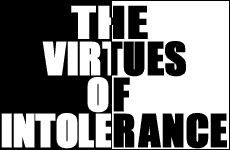 Vampire Weekend's Surprising Jewish Stories
Vampire Weekend's Surprising Jewish Stories


5 min read
The form of tolerance that pretends there is no such thing as evil is itself wrong.
Feb 17, 2002 -- Europeans always thought of George Bush as a Texas yokel, and now they have their proof: his "axis of evil" speech to the US Congress. "Absolutist," harrumphed European Commissioner Chris Patten. "Simplistic," shot back French Foreign Minister Hubert Vedrine. Any rube knows that North Korea, Iran, Iraq are neither "evil" nor linked in an "axis," says European sophisticates, appalled that they must share the same planet with riff-raff who claim otherwise.
The Europeans, of course, know full well that the regimes fingered by Bush are about as evil as they come. But even in America, words like evil are not normally used in polite company, let alone in public discourse. Modern people don't talk like that. Just a short time ago, the Clinton State Department decided to stop referring to the same states as "rogue regimes," preferring instead the less judgmental label: "countries of concern." Good people are tolerant, we Westerners like to believe. The march of progress is marked by an ability to understand the Other, and a commitment to cure humanity of the vicious hatreds that poisoned the last century. To the extent there are people who haven't gotten the message, say good Westerners, we certainly do not want to become like them.
If there is anything that is simplistic, it is acting as if tolerance is an absolute good.
If there is anything that is simplistic, however, it is acting as if tolerance is an absolute good. Of course tolerance is a necessary antidote to racism and all sorts of irrational phobias toward people and cultures whose only sin is to be different. But a form of tolerance that pretends there is no such thing as evil is itself wrong.
At some level, this is understood. Who today would argue with Edmund Burke's adage from over a century ago: "The only thing necessary for the triumph of evil is for good men to do nothing." Yet there is little doubt the West has preferred to err on the side of tolerance.
What George Bush has done, and Ronald Reagan before him with his "evil empire" slam at the Soviet Union, is similar to a child crying out that the emperor has no clothes. We can treat tyrants and terrorists as if they are acceptable members of the community of nations, but that does not change who they are. And it is impossible to begin the fight back without saying the truth: they are evil.
Intolerance, far from being an anathema to progress, it is essential to it.
In a wonderful essay in the Wall Street Journal last week, Michael Novak recalled just how powerful that single judgmental word can be. "You know what caused the downfall of the Soviet Union?" Reports Novak on a conversation with an ex-Soviet general, "That damn speech about the evil empire! That's what did it!" To the questioning eyes of one American, the general added: "It was an evil empire. It was." As odd as it is to say it, intolerance, far from being an anathema to progress, it is essential to it. Progress depends on intolerance for the status quo. In the ancient world (and in some cultures today) there was no notion there could be a better future – there was only Fate. The Western idea of progress began with two Jewish concepts: that time had a moral direction, and that one people could judge another.
The Bible said history is linear: Time began with creation, and its destination was a messianic era in which there would be peace on earth. The idea that history was going somewhere and that people could do something about it was new. Though taken for granted in the West, there is nothing inevitable about this notion, and it is not shared by all cultures.
An even more fundamental concept is that God's realm extends beyond a single people. All politics is local, we say, but in ancient times, so were all gods. The Bible vividly rejected such boundaries with stories such as that of Jonah, in which God could not be escaped by setting sail on a ship.
Without monotheism and its offspring -- universal morality -- the bedrock Western notion of universal human rights is judgmental par excellence.
Without speaking of evil, it is impossible to make fundamental distinctions.
Bush seems to realize that without speaking of evil, it is impossible to make fundamental distinctions, such as between regimes that must be toppled before they obtain nuclear weapons, and countries in whose hands the same weapons can help produce peace. The significance of Bush's speech is not just in the regimes he singled out, but his frontal challenge to the idea that silence in the face of evil is sophisticated and willful blindness is moral.
This article originally appeared in the Jerusalem Post.
